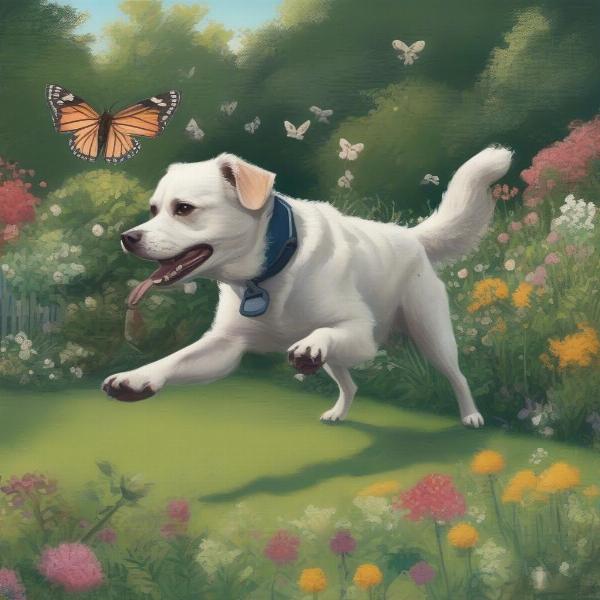Moths fluttering around your porch light might be a tempting snack for your curious canine. But can dogs eat moths? While an occasional moth likely won’t cause serious harm, it’s generally not recommended to let your dog munch on these insects. This article will explore the potential risks and benefits (if any) of dogs eating moths, and provide guidance on how to keep your furry friend safe.
Are Moths Toxic to Dogs?
Most common moths are not inherently toxic to dogs. However, some species, particularly the Garden Tiger Moth and its caterpillars, contain toxins that can cause mild gastrointestinal upset, such as vomiting or diarrhea. While rare, an allergic reaction is also possible, manifesting as itching, hives, or facial swelling.
Ingestion of a large number of moths, especially those with irritating hairs or scales, can also lead to more significant digestive issues. Think of it like this: a single french fry won’t hurt, but a whole bag might upset your stomach. The same principle applies to dogs and moths.
What Should I Do If My Dog Eats a Moth?
If your dog snags a moth, don’t panic. Monitor them closely for any signs of distress, such as vomiting, diarrhea, lethargy, or difficulty breathing. If these symptoms appear, contact your veterinarian immediately. For mild cases, your vet might recommend supportive care, like ensuring your dog stays hydrated. More severe reactions might require medication or further treatment.
 Dog Eating a Moth in the Garden
Dog Eating a Moth in the Garden
“It’s always better to be safe than sorry,” advises Dr. Emily Carter, DVM, a veterinary specialist in small animal internal medicine. “If your dog ingests anything unusual, contacting your veterinarian is the best course of action.”
Preventing Moth Consumption
The easiest way to avoid potential problems is to prevent your dog from eating moths in the first place. Here are some tips:
- Minimize moth attractants: Reduce outdoor lighting at night, as this attracts moths. Consider using yellow “bug lights,” which are less attractive to insects.
- Keep your dog on a leash: During evening walks, keep your dog on a leash to prevent them from chasing and consuming moths.
- Train your dog: Teach your dog the “leave it” command. This can be invaluable in preventing them from eating moths and other potentially harmful things.
- Regularly inspect your garden: If you have a garden, regularly check for moths, caterpillars, and other insects that your dog might be tempted to eat.
Conclusion
While the occasional moth snack is unlikely to cause serious harm to most dogs, it’s best to err on the side of caution. By taking preventative measures and monitoring your dog closely, you can help keep them safe and healthy. Remember, if your dog exhibits any unusual symptoms after eating a moth, contact your veterinarian immediately.
FAQ
- Are all moths poisonous to dogs? No, most common moths are not poisonous. However, some species can cause mild gastrointestinal upset or allergic reactions.
- What are the signs of moth poisoning in dogs? Vomiting, diarrhea, lethargy, difficulty breathing, itching, hives, and facial swelling.
- What should I do if my dog eats a moth? Monitor them closely and contact your veterinarian if they show any signs of distress.
- How can I prevent my dog from eating moths? Minimize moth attractants, keep your dog on a leash during evening walks, train them the “leave it” command, and regularly inspect your garden.
- Can mothballs harm my dog? Yes, mothballs are highly toxic to dogs and should never be accessible to them.
- Are moth caterpillars harmful to dogs? Some moth caterpillars, like the Garden Tiger Moth caterpillar, can be toxic to dogs.
- Can eating a moth kill my dog? While unlikely, a severe allergic reaction or ingestion of a large quantity of toxic moths could potentially be life-threatening.
About ILM Dog
ILM Dog is your trusted resource for expert advice on all aspects of dog care, from breed selection and puppy care to senior dog health and training. We offer practical, reliable information to help dog owners worldwide provide the best possible care for their furry companions. Our expertise covers a wide range of topics, including nutrition, grooming, behavior, and product recommendations. For personalized advice or to learn more about our services, please contact us at [email protected] or call us at +44 20-3965-8624.